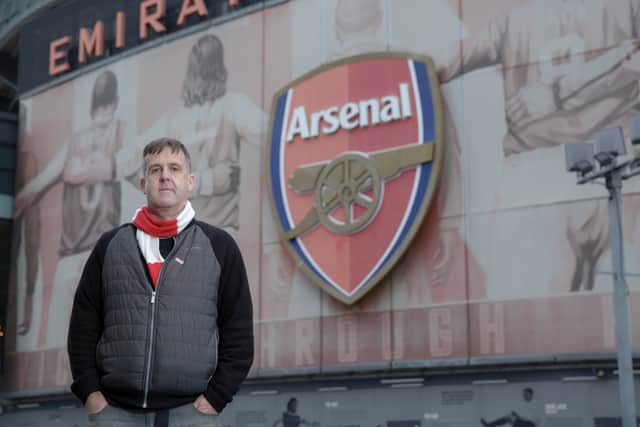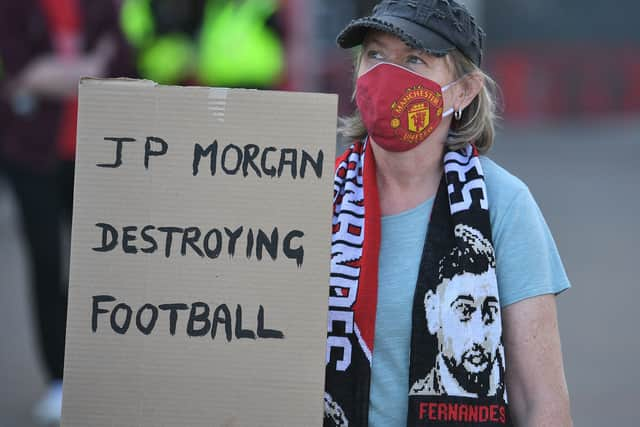European Super League documentary: what happened to ESL - and how to watch Super Greed: The Fight for Football
This article contains affiliate links. We may earn a small commission on items purchased through this article, but that does not affect our editorial judgement.
and live on Freeview channel 276
Sky original documentary Super Greed: The Fight for Football looks at the most contentious event in the game’s recent history, one year on.
The documentary charts the story of the European Super League (ESL) - an ill-fated idea that provoked huge backlash across Britain as soon as it was announced.
Advertisement
Hide AdAdvertisement
Hide AdFootball pundits, fans and even Boris Johnson spoke out against the proposals, with the prime minister comparing the imagined new league as a “cartel”.
But what was the European Super League and why did the idea go down like a lead football?
What was the European Super League?
On Sunday 18 April 2021, 12 of the biggest football teams in the world, including six Premier League clubs, announced they would form a new football league - the European Super League.
In the ESL, the founding clubs would be guaranteed a place in the competition, not needing to qualify through their home leagues.
Advertisement
Hide AdAdvertisement
Hide AdThree other teams were due to join the original 12, bringing a total of 15 clubs that would be guaranteed a spot in the league every season.
Only five other clubs would be able to qualify for the ESL each season, based on their prior performances.
The ESL was billed as an alternative to the UEFA Champions League and would be financed by investment bank JP Morgan.
Which clubs were involved in the ESL?
Six English football clubs were involved, they were: Arsenal, Chelsea, Liverpool, Manchester City, Manchester United and Tottenham Hotspur.
Advertisement
Hide AdAdvertisement
Hide AdItalian clubs AC Milan, Inter Milan, and Juventus, and Spanish clubs Atletico Madrid, Barcelona, and Real Madrid were also founding members.


Why was the ESL controversial?
The move to a competition where membership was not based on merit was seen by fans across the world as a rejection of what football was about.
The founding club members were nicknamed the dirty dozen because they would receive an unfair advantage by qualifying for the league automatically.
Whereas to qualify for the UEFA Champions League, English clubs must place in the top four of the Premier League.
Advertisement
Hide AdAdvertisement
Hide AdEqually, in the English Premier League and Championship, the bottom three teams are relegated.
The top two teams in the Championship and a third from a four-team playoff process are promoted to the Premier League. There are promotions and relegations at every level of the English football pyramid.
This system means that the progress of every English football club was based on merit each season, with no team being privileged over another.


What happened to the ESL?
There was an immediate international backlash against the proposals from all corners of the football world.
Advertisement
Hide AdAdvertisement
Hide AdFans protested outside the stadiums of the English clubs that supported the ESL, and many players from these clubs released statements criticising their owner’s decision.
Aleksander Ceferin, president of UEFA warned that ESL clubs could be banned from the Champions League and their players prevented from playing in the Euros and the World Cup.
By Tuesday evening it was rumoured that Manchester City and Chelsea were planning to pull out of the ESL, and by the end of the night all six English clubs announced they were withdrawing.
Within less than three days of the ESL’s official announcement it was already dead in the water.
Advertisement
Hide AdAdvertisement
Hide AdThe following day, ESL founder Andrea Agnelli confirmed that he did not expect the project to move forward.
In June, the Premier League clubs that had been involved in the ESL each paid a £3 million settlement and agreed to a stricter penalty of a £25 million fine and 30 point deduction each if they tried a similar move in the future.
When is Super Greed on TV?
Super Greed: The Fight for Football will be released on Sky Documentaries and streaming service NOW at 10pm on 21 March.
A message from the editor:
Thank you for reading. NationalWorld is a new national news brand, produced by a team of journalists, editors, video producers and designers who live and work across the UK. Find out more about who’s who in the team, and our editorial values. We want to start a community among our readers, so please follow us on Facebook, Twitter and Instagram, and keep the conversation going. You can also sign up to our newsletters and get a curated selection of our best reads to your inbox every day.
Comment Guidelines
National World encourages reader discussion on our stories. User feedback, insights and back-and-forth exchanges add a rich layer of context to reporting. Please review our Community Guidelines before commenting.
